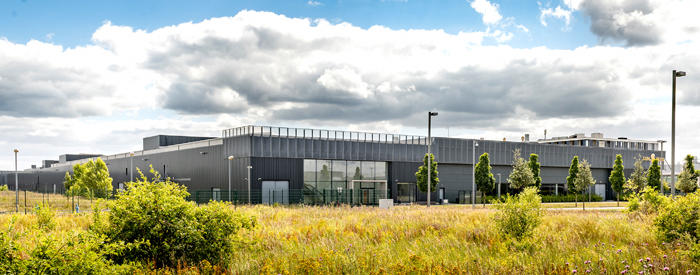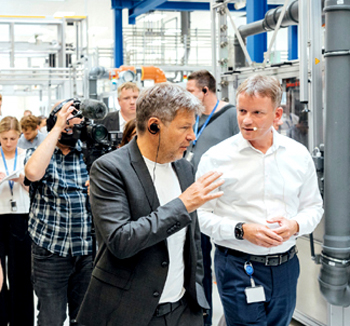 |
Press photos (2): Meyer Burger
|
September 2025 |
250905 |
ENERGY CHRONICLE |
 |
Press photos (2): Meyer Burger
|
Swiss solar company Meyer Burger Technology AG announced on September 17 that the search for an investor for the entire group of companies had finally failed. According to the board of directors, “from today's perspective, there are no longer any realistic chances of rescuing the entire group of companies, including the parent company.” For the latter, the aim is therefore to conclude a “debt settlement agreement” under Swiss law, which would exclude a liquidation dividend for shareholders. At the same time, efforts are continuing to sell parts of the various group companies in Switzerland, Germany, and the USA.
 |
On July 30, 2022, Federal Minister for Economic Affairs Robert Habeck visited the solar cell production facility reactivated by Meyer Burger in the Thalheim district of Bitterfeld-Wolfen (right: former CEO Gunter Erfurt). |
The collapse of the parent company primarily affects the approximately 600 employees at the East German locations in Bitterfeld-Wolfen (solar cell production) and Hohenstein-Ernstthal (development and mechanical engineering). Meyer Burger filed for insolvency proceedings for both plants at the end of May, which have since been opened. The wages and salaries of those who were laid off were secured until the end of August by the insolvency money. The approximately 500 employees at the Freiberg plant (solar modules) had already received their notices of termination at the end of March 2024 (240312). The approximately 300 employees in the US were laid off in May of this year. The 45 employees still working in Switzerland were also laid off, with the exception of a liquidation team.
In May 2021, Meyer Burger Technology AG took over two former centers of the German solar industry in order to revive them: In Bitterfeld-Wolfen (Saxony-Anhalt), this was the solar factory of the company Sovello, which had filed for insolvency in 2012 (120511). It also reactivated a solar factory in Freiberg, Saxony, that had belonged to the former industry leader Solarworld, which had tried to hold its own against Chinese dumping competition for the longest time before it also had to cease production in 2018 after filing for bankruptcy twice (180909 and Hintergrund, May 2017).
Of course, this intended revival of the solar industry in Germany and Europe could only have succeeded with political support from the German government and the EU Commission due to China's overwhelming market power. This had already become apparent two decades ago, when more and more solar companies such as SolarWorld, Solon, Q-Cells, First Solar, and Conergy, which had recently seen their profits explode and were therefore considered particularly hot stock market tips, suddenly announced increasingly poor figures, decided to cut back production, or even filed for bankruptcy. The main reason for this was that most of the solar cells sold in Germany were now manufactured elsewhere: within a short period of time, China had become the world's leading manufacturer of solar cells, producing mainly for export and comparatively little for its own domestic market (090812).
With strong support from the Beijing government, Chinese exporters were able to gain an ever-increasing share of the photovoltaic market, especially in Germany, with dumping prices, which naturally came at the expense of domestic manufacturers, who were only able to compete in the further processing of imported solar cells into ready-to-connect modules or in the production of indispensable accessories such as inverters. However, there has not been a single German manufacturer of solar cells since 2018, after SolarWorld also disappeared. On the other hand, companies that merely traded in photovoltaics by purchasing, marketing, or installing them for end customers were not affected at all. In fact, they benefited from the cheap imports. This segment of the solar industry also tended to blow in the manufacturers' faces, preventing effective defensive measures against Chinese dumping.
The EU Commission also showed little willingness to take on the EU's second-largest trading partner on this issue. It was not until September 2012 that it finally decided to initiate anti-dumping proceedings due to the flooding of the European market with solar cells from China. It was responding to a request from the newly founded industry association “EU Pro Sun,” in which more than twenty companies had joined forces on the initiative of SolarWorld AG (121013). SolarWorld had previously filed a request in the US to initiate anti-dumping proceedings, which the US Department of Commerce granted in May 2012 (120511). Five months later, the Department confirmed these punitive tariffs, justifying them on the grounds that Chinese imports were subsidized by the Beijing government by 15 to 16 percent and sold at 18 to 250 percent below the “fair” market price (121013).
However, it took until June 2013 before the EU Commission imposed similar anti-dumping duties, which it expressly did not want to be understood as protectionism or “punitive tariffs.” Shortly thereafter, these duties were replaced by a mutually agreed arrangement whereby Chinese importers committed to comply with maximum quantities and minimum prices for their solar modules (130705). From the perspective of the European manufacturers affected, however, this was merely a “lame compromise” that in practice did not significantly prevent Far Eastern competitors from continuing their old practices (150508).
Nothing significant had changed in this unsatisfactory state of affairs when, in the spring of 2021, Meyer Burger began to revive solar cell production in the so-called “Solar Valley” near Bitterfeld-Wolfen, which had been discontinued almost a decade ago, as well as module production in Freiberg, which had been discontinued just under three years ago. And this remained the case under the new federal government formed by the SPD, Greens, and FDP six months later. In its coalition agreement, the government had agreed to remove all “obstacles” that could stand in the way of the planned expansion of solar power capacity to around 200 gigawatts by 2030. However, this ambitious goal was also easier to achieve with cheap Chinese imports than with protective measures and targeted subsidies for the development of an independent solar industry. In addition, it was initially overshadowed by Russia's invasion of Ukraine, which fully occupied the new federal government and caused many other issues to be put on hold. Compared to the dependence on Russian gas supplies, which had been promoted with incredible recklessness and suppressed for a long time, and which now suddenly became apparent, the at least equally great dependence on Chinese solar module supplies seemed far less threatening or even trivial.
At least the Green-Red part of the traffic light coalition welcomed the revival of German solar cell production by the Swiss company Meyer Burger. In mid-2022, Green Federal Minister of Economics Robert Habeck visited the plant in the Thalheim district of Bitterfeld-Wolfen. Later, he also listened attentively to CEO Gunter Erfurt, who gave him a tour of the factory halls. Although the CEO was an excellent expert in the field of photovoltaics, he had probably underestimated the political obstacles standing in the way of a lasting revival of the “Solar Valley” in Thalheim. In any case, Meyer Burger's business results left more and more to be desired.
Against this backdrop, in mid-2023, the German government presented a concept for the targeted promotion of individual “lighthouse projects” in the domestic solar industry (230605). Meyer Burger would have been the main beneficiary of such subsidies for individual “lighthouse projects.” However, this would not have addressed the fundamental problem of Chinese dumping. CEO Erfurt therefore considered this concept to be insufficient and ill-advised. Instead, in January 2024, he and other solar companies appealed to the federal government to make the level of EEG subsidies dependent on whether solar panels were manufactured in the EU or not. Erfurt linked the demand for such a “resilience bonus” with the announcement that module production in Freiberg would otherwise be closed down. In Germany, only the Bitterfeld cell production would then remain to support the planned ramp-up of module production at the Goodyear plant in the US state of Arizona (240108).
This “resilience bonus” was a very sensible proposal. It would have made it possible to help establish an independent solar industry in Germany and other EU countries through a graduated EEG subsidy for photovoltaics, without making Chinese imports more expensive through anti-dumping duties and thus directly hindering them. Instead, an elegant market mechanism would have ensured that the expensive subsidization of solar power would have mainly benefited the reconstruction of a strong solar industry independent of other EU countries, rather than stimulating further capacity expansion in China.
The Green Federal Minister for Economic Affairs, Robert Habeck, was then also prepared to anchor such a resilience bonus retrospectively in the solar package, which was approved by the cabinet in August 2023 (230802), but then, due to internal coalition disputes after the first reading in the Bundestag, it did not progress any further and could therefore only finally be passed on April 26, 2024 (240402). Meanwhile, the FDP, in the form of its chairman and Federal Minister of Finance Christin Lindner, also refused to agree to such a regulation, which was rejected by pure solar marketers because they feared it would reduce their profits. In order not to jeopardize the compromises reached so far in negotiations with the FDP and to avoid further delaying the passage of the entire solar package, the Greens and SPD therefore decided to forego the resilience bonus.
For Meyer Burger, this was probably the beginning of the end. As announced, the company ceased production in Freiberg in March 2024, while solar cell production in Bitterfeld-Wolfen was maintained for the time being (240312). However, the Bitterfeld solar cells were not sent to the US for further processing. Instead, the module factory there was also closed in May of this year instead of being expanded. The original plans to set up solar cell production at another US location were also not pursued. The financing opportunities resulting from the Inflation Reduction Act (IRA) in the US were apparently not as rosy as CEO Gunter Erfurt had described in an interview with Capital magazine in June 2023: "The Americans are really rolling out the red carpet for us right now. It is absolutely impressive how quickly things are progressing there and the level of attention being given to a comparatively small company like Meyer Burger."
Gunter Erfurt, then 43, had been Managing Director and member of the
Executive Board of Meyer Burger (Germany) GmbH since November 2015. He
is a German citizen and, after training as an engineer at the West Saxon
University of Applied Sciences in Zwickau, he earned his doctorate in
applied physics at the TU Bergakademie Freiberg. As CEO of Meyer Burger
Technology AG, he led the entire group after it transformed itself in
2020 from a manufacturer of machines for solar cells and solar modules
to a producer of cells and modules. After the business concept he
pursued failed as a result of the FDP's opposition to the resilience
bonus supported by Habeck, he and CFO Markus Niklas had to leave the
Swiss company in September last year. Since August 18, he has been
Chairman of the Supervisory Board of Next2Sun AG, a company specializing
in vertical bifacial photovoltaics (“Agri-PV”). He also continues to
serve as a member of the Executive Board of the German Solar Industry
Association (BSW) and other solar industry committees, as well as on the
Scientific Advisory Board of the Institute for Solar Energy Research
Hameln (ISFH). He was previously a long-standing member of the Board of
Trustees of Fraunhofer ISE.